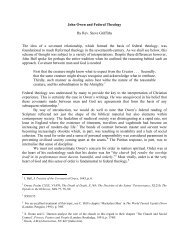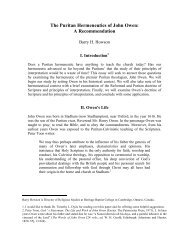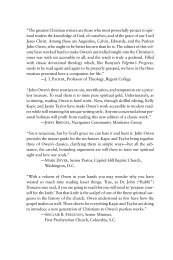M.TH. LONG DISSERTATION (LD6.1) - John Owen
M.TH. LONG DISSERTATION (LD6.1) - John Owen
M.TH. LONG DISSERTATION (LD6.1) - John Owen
Create successful ePaper yourself
Turn your PDF publications into a flip-book with our unique Google optimized e-Paper software.
<strong>John</strong> <strong>Owen</strong>’s Theological Context<br />
Therefore, building on this dissertation, further theological research is required.<br />
This would require biblical and theological evaluation of <strong>Owen</strong>’s views of union with<br />
Christ and justification. His insights could then be appropriated, and where necessary<br />
modified, to enrich contemporary Protestant theology. In particular, <strong>Owen</strong> on union<br />
with Christ and justification might serve us in three contemporary debates. First, as a<br />
theologian who emphasises the place of union with Christ with respect to justification,<br />
<strong>Owen</strong> provides an historic Protestant resource for investigating recent claims by the<br />
‘Finnish School’ of Luther research regarding the place of union with Christ in Luther’s<br />
theology, particularly as those claims relate to Luther’s doctrine of justification. 228<br />
Secondly, <strong>Owen</strong> provides material for considering the claims of those proponents of the<br />
‘New Perspective on Paul’ who regard Pauline participation language and Reformed<br />
imputation language as standing in tension. 229 Thirdly, the doctrine of justification is a<br />
live issue in the light of ecumenical debates and Protestant-Roman Catholic agreements<br />
such as ARCIC, ECT, and the Joint Lutheran/Roman Catholic Declaration on Justification, all<br />
of which remain controversial. 230 As one of the major expositors of the Reformed<br />
doctrine of justification, <strong>Owen</strong> offers resources for adequately understanding and<br />
evaluating the theology and significance of these agreements, and for formulating a<br />
Protestant response.<br />
Thus, <strong>Owen</strong>’s teaching on justification and union with Christ does not merely<br />
offer a fascinating insight into the world of seventeenth century English Reformed<br />
228 For the contours of this debate, see Braaten and Jenson 1998; Jenson 2003; Metzger 2003; Seifrid 2003;<br />
Trueman 2003.<br />
229 The so-called New Perspective on Paul (NPP) is, of course, far from monolithic, and some advocates<br />
would be far closer to historical Reformed formulations than others. The material on NPP is vast, and we<br />
cannot begin to detail it here. A good place to start, both for essays for and against NPP, and for<br />
bibliographical resources, is Mark M. Mattison’s website, The Paul Page, http://www.thepaulpage.com (last<br />
accessed 2 May 2005).<br />
230 Some of the relevant documents include ARCIC II 1987; ECT 1997; The Lutheran World Federation<br />
and the Roman Catholic Church 2000; Lane 2002; Husbands and Trier 2004; Mattes 2004.<br />
69





